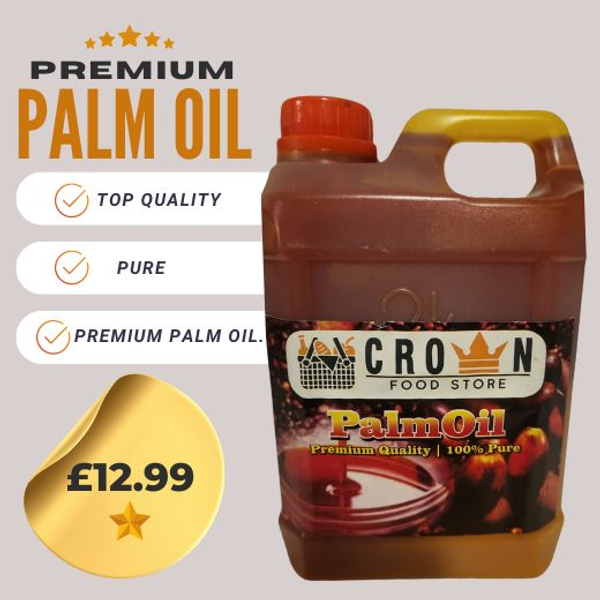From Farm to Table: The Journey of Our Premium Palm Oil
23rd May 2025
In the heart of tropical plantations, nestled among rows of lush green fronds, begins the story of a humble fruit that fuels kitchens across the globe. This is the journey of our premium palm oil — a versatile, sustainable, and essential ingredient found in everything from savory dishes to household products. Join us as we trace its path from farm to table and uncover the truth behind this golden elixir.
What is Palm Oil?
Palm oil is a natural oil extracted from the fruit of the oil palm tree (Elaeis guineensis). It's prized for its high yield, long shelf life, and unique composition that makes it solid at room temperature yet free of trans fats. This makes palm oil a favored ingredient in food manufacturing and household cooking.
In the UK, palm oil has steadily gained popularity as consumers become more aware of its benefits and the importance of sustainable sourcing. Whether you're shopping for palm oil in Tesco or browsing your local grocery store, it's vital to understand where this product comes from and how it gets to your kitchen.
Cultivation: Where It All Begins
The journey starts on certified sustainable palm oil plantations. These plantations adhere to strict environmental and ethical standards set by organizations like the RSPO (Roundtable on Sustainable Palm Oil). Here, oil palm trees are cultivated using responsible farming practices that preserve biodiversity, protect wildlife habitats, and support local communities.
Farmers harvest the fruit bunches every 7 to 10 days. These reddish-orange fruits are rich in oil and are processed shortly after harvesting to maintain freshness and quality.
Processing: Extracting Liquid Gold
Once harvested, the fruits are transported to nearby mills for processing. The extraction process involves:
-
Sterilization: Fruit bunches are steamed to prevent enzymatic activity and make fruit removal easier.
-
Stripping: Fruits are separated from the bunch stalks.
-
Digestion and Pressing: Fruits are heated and mashed to release the oil.
-
Clarification: The crude palm oil is purified by removing water and impurities.
The result is a rich, golden oil ready for refining.
Refining and Packaging
Refined palm oil undergoes further processing to meet food-grade standards. This includes:
-
Degumming: Removing phospholipids
-
Neutralization: Eliminating free fatty acids
-
Bleaching: Filtering out color pigments
-
Deodorizing: Removing odorous compounds
Once refined, the oil is packaged and shipped for various uses, including palm oil for cooking. In the UK, supermarkets like Tesco offer responsibly sourced options that meet high quality and sustainability benchmarks.
The Culinary Star: Palm Oil for Cooking
In kitchens across the UK and beyond, palm oil is celebrated for its high smoke point, neutral flavor, and versatility. It's used in:
-
Frying
-
Baking
-
Sauces and gravies
-
Ready meals
Its stability at high temperatures makes it ideal for both commercial and home cooking.
Palm Oil Benefits
Despite common misconceptions, palm oil offers several health and environmental benefits:
1. Nutritional Value
Palm oil is rich in:
-
Vitamin E (tocotrienols and tocopherols)
-
Carotenoids (precursors to Vitamin A)
-
Antioxidants
These compounds support skin health, immune function, and cellular protection.
2. Efficient Land Use
Palm oil trees produce more oil per hectare than any other oil crop, making it the most land-efficient vegetable oil in the world. Replacing palm oil with other crops would require up to 10 times more land.
3. Economic Impact
Millions of smallholder farmers depend on palm oil cultivation for their livelihoods. When sourced sustainably, palm oil can be a powerful tool for poverty alleviation and rural development.
Palm Oil Facts You Should Know
Let’s set the record straight with some essential palm oil facts:
-
Palm oil is not inherently bad: Unsustainable practices are the problem, not the crop itself.
-
Sustainable palm oil exists: RSPO-certified oil supports responsible production.
-
It's widely used: Over 50% of packaged products in supermarkets contain palm oil.
-
It's versatile: Found in foods, cosmetics, cleaning products, and biofuels.
Palm Oil in the UK: Transparency and Trust
UK retailers, including Tesco, are committed to transparency. Many now exclusively sell products containing sustainably sourced palm oil. Consumers can check labels for RSPO certification and look for brands that are part of the UK Roundtable on Sourcing Sustainable Palm Oil.
Government initiatives and NGO efforts have also raised awareness, helping consumers make informed choices about the palm oil they purchase.
Our Commitment to Sustainability
Our premium palm oil is proudly sourced from certified plantations committed to ethical and environmentally friendly practices. We ensure traceability from farm to table, allowing you to enjoy our products with confidence and peace of mind.
By choosing our palm oil, you're supporting:
-
Biodiversity conservation
-
Fair labor practices
-
Community development
-
Climate-smart agriculture
Conclusion: The Golden Journey
The story of palm oil is one of transformation and transparency. From the sun-drenched plantations of the tropics to your local Tesco aisle, this golden oil plays a vital role in our lives and economies.
Understanding the journey of palm oil in the UK helps debunk myths and highlights the importance of sustainable choices. Whether you're using palm oil for cooking a family meal or learning about palm oil benefits, you're now equipped with the facts to make informed, ethical decisions.
Join us in supporting a better future for people and the planet — one drop of premium palm oil at a time.

